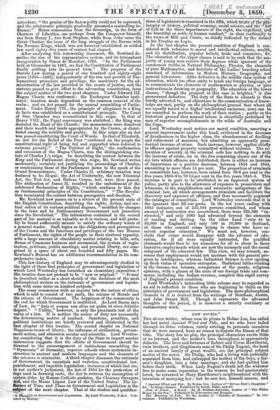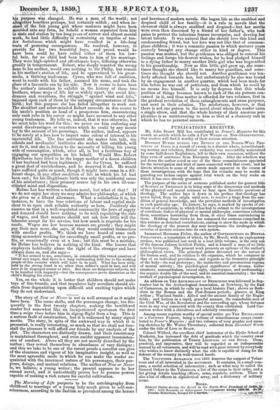NEW NOVELS. * THE clever write; whose nom de plume is
Holme Lee, has called her last novel Against Wind and Tide, and we who have toiled through its three volumes, vainly striving to persuade ourselves that we were amused, have no reason to dispute the fitness of that title. The story has no plot, the principal characters excite little or no interest, and the author's tone throughout is oppressively didactic. The lives and fortunes of Robert and Cyrus Hawthorne, twin brothers, and illegitimate sons of Sir Philip Nugent, the head. of an ancient family of great wealth, are the principal subject matter of the novel. Sir who had a living wife judicially separated from him, had entrapped the mother of the boys, a far- mer's daughter, into a false marriage, and she had quitted him before their birth. When Lady Nugent's death left the widower free to make some reparation to the woman be had passionately loved, he returned to Mary Hawthorne's neighbourhood with the intention of marrying her ; but he saw her, himself unseen, and • Against Wind and Tide. By Hoime Lee, Author of " Sylvan Holt's Daughter." &c. In three volumes. Published by Smith, Elder, and Co. Now or Never. A Novel. By M. Betham-Edwards, Author of " The White House by the Sea." Published by Edmonston and Douglas. The Morning of Life. By the Author of "Gordon of Duncairn." In two volumes. Published by Westerton. his_purpose was changed. He was a man of the world; not altogether heartless perhaps., but certainly selfish ; and when in- stead of the fair young girl whose manners might have been moulded into any form, he beheld a woman separated from him in state and station by ten long years of sorrow and almost menial work, he had little difficulty in restraining an impulse of ten- der foolishness which might have resulted in a life-long train of pestering consequences. He resolved, however, to provide for her two beautiful boys, and proud would he have been could he have called either of them his law- ful heir, for no child. had been born to him of his marriage. They were high-spirited and affectionate boys, differing otherwise greatly in temperament. Robert, who deeply resented the wrong done to his mother, would owe nothing to Sir Philip, but remain in his mother's station of life, and be apprenticed to his great- nnele, a thriving tradesman. Cyrus, who was full of ambition, went to reside with his father, assumed his name, and took the place of a favourite son by his side. Now it seems to have been the author's intention to exhibit in the history of these two brothers, whose ways of life lay so widely apart, the social hin- drances and vexations, the struggle " against wind and tide," imposed upon each of them by the unhappy circumstances of their birth ; but this purpose she has failed altogether to work out. The steadfast and sober-minded Robert succeeds in due course to his uncle's position as head of a prosperous firm, encountering only such rubs in his career as might have occurred to any other young tradesman. He tells us, indeed, that it was otherwise, but we must take his word for this ; we never see him enduring any social disadvantages or vexations which he could by any means lay to the account of his parentage, The author, indeed, appears to be sorely at a loss how to impart some colour of interest to his uneventful life. The fine sentiment she makes him talk, the schools and mechanics' institutes she makes him establish, will not do it, and she is driven to the necessity of killing his young wife of consumption, which, after all, is but a factitious way of engaging our sympathies on his behalf. Would Mrs. Robert Hawthorne have lived to be the happy mother of a dozen children if her husband had been legitimate ? As for Cyrus, he suffered a great deal of wretchedness, and he deserved it all. He would have suffered quite as much, though it might have come in a dif- ferent shape, in any other condition of life in which his lot had been cast ; for his illegitimate birth was only the accidental cause of his misfortunes ; their primary source lay in his own ill-con- stituted mind and disposition.
Holme Lee has written a tedious novel, but what of that ? If we do not enjoy her story we may admire her philosophy, of which she gives us a liberal allowance. What a satisfaction it is, for instance, to have the true relations of labour and capital made Clear to us upon such reliable authority as hers. Positively she assures us that in a well-regulated community the laws of supply and demand should have nothing to do with regulating the rate of wages, and that masters should not ask how little will the labourer accept for his service, but how much is requisite for his needs. Wages are low because masters are greedy; they might pay their men more, she says, if they would content themselves with smaller profits. We think we have heard of some such thing as masters working for exceedingly small profits, or no pro- fits, or occasionally even at a loss; but this must be a mistake, fox Holme Lee beheves in nothing of the kind. She knows that employers habitually abuse the right of the stronger and have always dime so, and she says-
" It has seemed to me, sometimes, in Considering this vexed question of labour and wages, that there is a long outstanding debt due to the working people of this country which will have to be paid. What has been with- held by the strong .hand is no other than robber's spoil in fact, and will have to he disgorged sooner or later. But these are dangerous subjects, not to be handled with impunity—lest the consequences prove disastrous as the child's flinging fire about.'
Yes, on the whole it is better that children should not make toys of fire-brands, and that impulsive lady novelists should ab- stain from dogmatizing upon difficult and exciting topics which they do not understand.
The story of Now or Never is not as well arranged as it might have been. The scene shifts, and the personages change, too fre- quently in the first twenty chapters, making the bewildered reader feel somewhat like an inexperienced sportsman the first time a snipe rises before him in zigzag flight from a bog. This is aserious fault of construction, but it is redeemed by many signal merits. The story, in spite of the awkward way in which it is presented, is really interesting, so much so that we shall not fore- stall the pleasure it will afford our friends by any analysis of the plot. The characters are distinctly drawn, and their consistency is maintained throughout, and even amidst 'apparent inconsisten- cies of conduct. Above all they are not merely described by the author ; they reveal themselves in abundance of racy dialogue; and this we take to be one of the surest proofs a novelist can give of the clearness and vigour of his imaginative insight, as well as the most agreeable mode in which he can make the reader ac- quainted with the innermost nature of his personages, their pur- poses, doings, and mutual relations. The author of Now or Never is, we believe, a young writer ; the present appears to be her second novel, and it undoubtedly proves her to possess powers capable of making a rich return for careful cultivation.
The Morning of _We purports to be the autobiography from childhood to marriage of a young lady much given to self-eon- scionsness, according to the fashion so prevalent among the heroes and heroines of modern novels. She began life as the snubbed and despised child of her family—it is a rule in novels that the cleverest child is always snubbed and despised—but her merits were even then discerned by a friend of her father's, who took pains to protect the infantine femme incomprise, and develop her latent talents. It was natural that she should love this kind and condescending friend, but her love was not like that of common- place children ; it was a romantic passion to which maturer years scarcely brought any change either in kind or degree. This passion was mutual, but the gentleman was obliged to conceal his feelings and forego his dearest wishes, for he had pledged himself to a dying father to marry another little girl who was bequeathed to his guardianship. Now as this little girl grew up, she some-, times thought she should like to marry her guardian, and some- times she thought she should. not. Another gentleman was ten- derly affected towards her, but unfortunately he also was bound by an engagement in another quarter, which had been made for him before he was out of petticoats, and from which he could by no means free himself. It is only by degrees that this whole position of things becomes known to each of the six persons con- cerned in it, and thus matter is afforded for two volumes, first in the gradual revelation of these entanglements and cross purposes, and next in their solution. The misfortune, however, is that there is not one person in the novel about whom the reader cares a single straw, and that the whole history of their amorous per- plexities is as uninteresting to him as that of a chancery suit in which he has no personal concern.



























 Previous page
Previous page